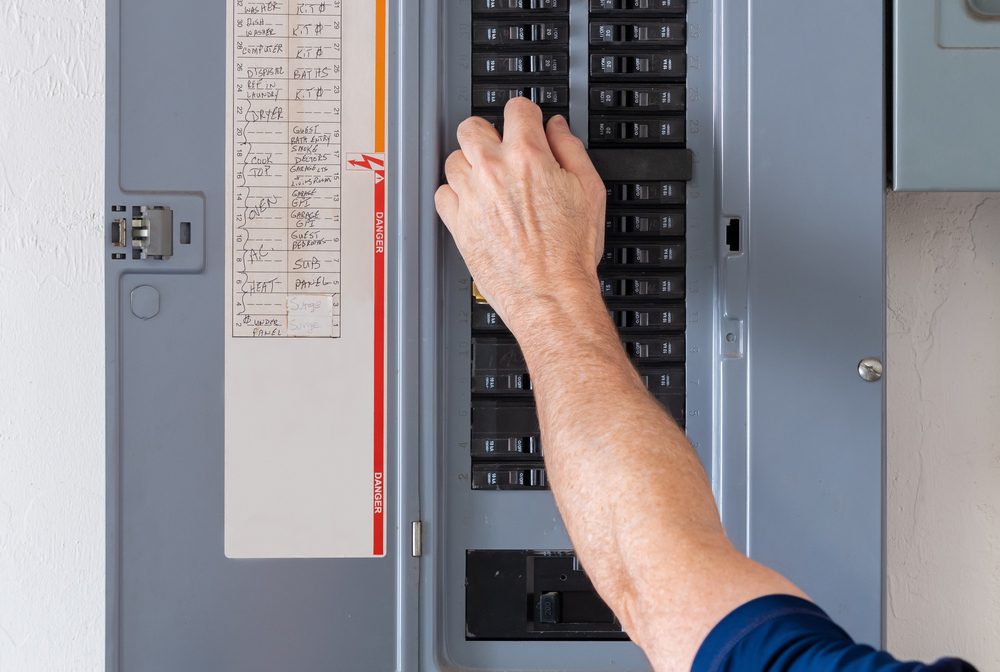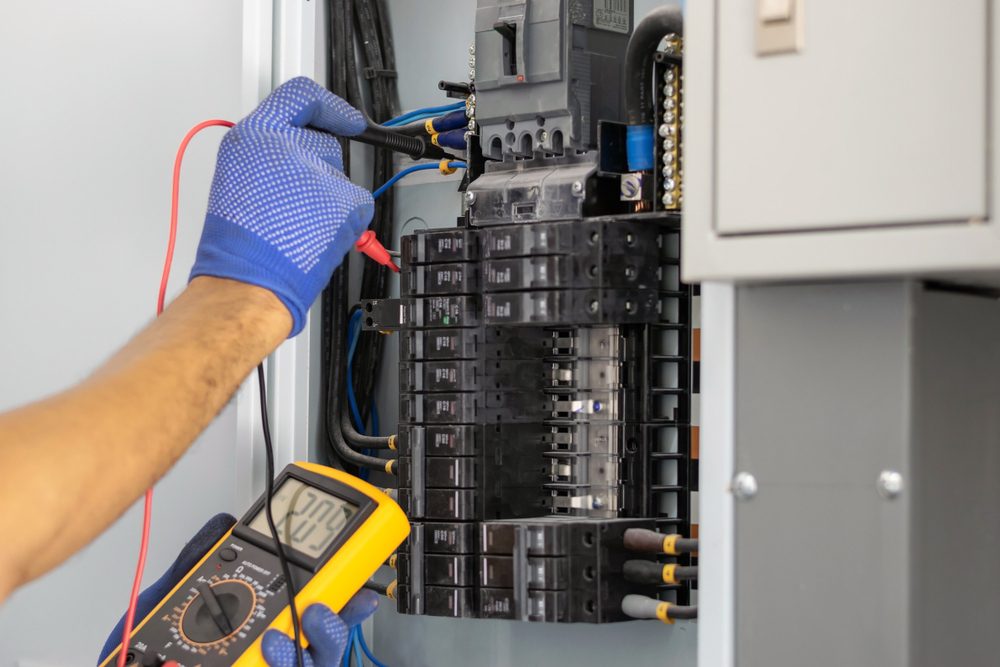
The way electrical systems in homes are set up, the main power lines run from overhead lines into the house or underground cables. Once they reach the house, they are wired into an electrical panel. This is the circuit breaker box for your home. In most homes, it will be in a utility closet or back room.
These main wires are then separated into branch circuits. Each branch wire has a circuit breaker associated with it. These branch wires run from the electrical panel to the plugs throughout your home. There are 120-volt branch circuits and 240-volt branch circuits.
Table of Contents
Circuit Breakers and Branch Circuits
The branch circuits in the electrical panel all start at the circuit breaker. The circuit breaker is the main power disconnect. From the circuit breaker, the voltage is split and lowered, with a single 240-volt circuit being divided to power two 120-volt bus bars.
Smaller circuit breakers are also used, often arranged in two rows. This is where the individual branch circuits that connect to your 120 and 240-volt outlets are held. Each one has a circuit breaker to start the line.
If you have an issue with the electrical panel in your house, you should have a professional look at it and determine if you need an electrical panel replacement. Here are the four main types of branch circuits in your home.

4 Types of Branch Circuits
1. Appliances
Dedicated appliance circuits can be either 120 or 240-volt. They are often required by code and connect electricity to a single appliance. Your clothes dryer, garbage disposal, air conditioners, and other large appliances with and without motors use these types of branch circuits.
You can also run an appliance branch circuit to an outlet. You will notice that these outlets don’t always look like standard plug-in outlets. This is because the plug has a different shape when it must provide 240-volt power to a large air conditioning unit or other appliance.
2. Lighting
Lighting circuits power the lights in your home. Most houses have multiple branch circuits for lighting covering one or more rooms each. It is common in modern homes that these circuits are independent. This serves a functional purpose, allowing you to turn off the outlet circuit and still have light.
3. Power Outlets
These circuits power the common plug-in outlets that are spread throughout your home. Sometimes they are separated by room, but they can also serve multiple rooms per circuit. You will find that in some small houses, entire levels of the home may only have a couple of circuits.
4. Bedroom and Living Room
This will depend on the wiring in your home, but sometimes all the lights and outlets in a single room use the same branch circuit. This is less common in modern homes, but it all depends on who wired the house and when it was done.
Read More: 5 Top Causes of Short Circuits in Homes and Ways to Respond
Multiwire Branch Circuits
Multiwire branch circuits are designed to connect one or more ungrounded circuits and a grounded circuit. These are often used in line-to-line appliances, with a common example being an electric range. You will often see these types of branch circuits with clothes dryers as well.
Here are rules that are standard when it comes to multi-wire branch circuits:
- All conductors originate from the same equipment.
- Provide a means to simultaneously disconnect or open each ungrounded conductor.
- Provide line-to-neutral loads
- Identify grounded conductors that share the same housing but connect to different ungrounded circuits.
You should look for local electrical services if you need help with multi-wire branch circuits.

Electrical Panel Replacement and Repair Services
As technology improves and becomes more vital, even newer homes will need to be updated. This is why it’s essential to make sure that you have an electrical panel that suits the needs of your home and family. Upgrading the electrical panel in your home comes with some profound benefits.
Benefits of Upgrading Your Electrical Panel
- Provides more outlets and circuits to be used.
- Avoid having your power interrupted by circuits tripping.
- Provide power for larger, more modern appliances.
- Allows you to stop over-crowding outlets or sharing too much power.
Remembering that electrical panels are a failsafe against fires and other electrical hazards is also important. If you suspect that your electrical panel is malfunctioning or that it isn’t working properly, make sure to contact a professional.
Our team of emergency electricians in Piscataway, NJ offer comprehensive electrical panel installation services for homes in your local area. We also offer a variety of other electrical solutions such as whole-house generator installation, ceiling fan repair, light fixture installation, wiring maintenance, and surge protection system configuration.
Gold Medal provides 24/7 emergency relief to people who are experiencing electrical issues in their homes. Give our electricians a call by phone at (732) 638-4317 to receive assistance with malfunctioning circuit breakers or other electrical issues in your house.


